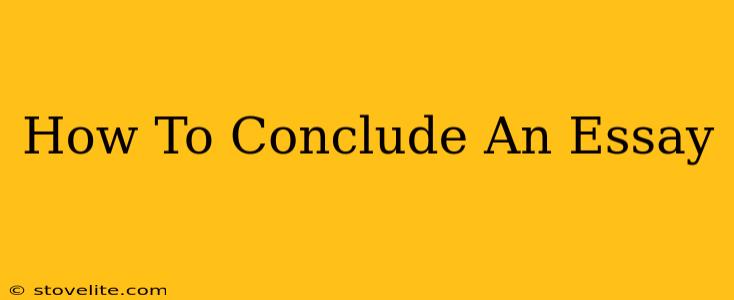Concluding an essay is more than just summarizing your points; it's about leaving a lasting impression on your reader. A strong conclusion reinforces your thesis, offers insightful closure, and leaves the reader with something to think about. This guide will walk you through crafting a powerful and effective essay conclusion.
Understanding the Purpose of a Conclusion
The conclusion isn't an afterthought; it's a crucial part of your essay. Its primary purposes are to:
- Restate your thesis (but not verbatim): Summarize your main argument in a fresh and insightful way. Avoid simply repeating your introduction.
- Summarize your main points: Briefly reiterate the key supporting evidence and arguments you've presented. This provides a sense of completeness.
- Offer a final thought or insight: This is your opportunity to leave a lasting impact. You can offer a broader perspective, suggest implications, or pose a thought-provoking question.
- Provide a sense of closure: The conclusion should feel satisfying and leave the reader feeling informed and engaged.
Effective Strategies for Concluding Your Essay
Several strategies can help you craft a compelling conclusion:
1. Synthesize, Don't Just Summarize:
Avoid simply listing your main points again. Instead, synthesize them—show how they connect and support your overall thesis. Explain the significance of your findings and how they relate to the larger context of your topic.
2. Offer a Provocative Question:
Ending with a thought-provoking question can encourage further reflection on your topic. This question should be directly related to your essay's argument and should stimulate further discussion.
3. Broaden Your Perspective:
Consider expanding your essay's scope by connecting your findings to a wider context. How does your argument contribute to a larger understanding of the topic? This demonstrates the significance of your work.
4. Call to Action (where appropriate):**
In certain essay types (like persuasive essays), a call to action can be effective. Encourage the reader to take a specific step or consider a particular viewpoint.
5. Use Strong, Concise Language:
Avoid wordiness or unnecessary details in your conclusion. Use strong, impactful language to reiterate your main points and leave a lasting impression.
6. Avoid Introducing New Information:
The conclusion is not the place to introduce new arguments or evidence. Focus on summarizing and synthesizing what you've already presented.
Common Mistakes to Avoid
- Simply restating the introduction: While you should reiterate your thesis, don't just copy and paste your introduction. Refine your argument and present it in a new light.
- Introducing new information: This can confuse the reader and weaken your conclusion.
- Ending abruptly: Your conclusion should feel satisfying and provide a sense of closure. Avoid abruptly ending your essay.
- Being overly apologetic: Don't apologize for your argument or downplay your findings. Have confidence in your work.
Example: Transitioning from Body to Conclusion
Let's say your essay discusses the impact of social media on teenagers. Instead of simply restating each point about mental health, cyberbullying, and social comparison, your conclusion might synthesize these points:
"In conclusion, while social media offers undeniable benefits for connection and information sharing, its pervasive influence on teenagers warrants careful consideration. The evidence presented clearly demonstrates a strong link between excessive social media use and negative impacts on mental health, increased cyberbullying, and distorted perceptions of self. This necessitates a proactive approach from parents, educators, and policymakers to promote responsible social media use and mitigate its potential harms."
By following these guidelines, you can craft a conclusion that effectively reinforces your thesis, leaves a lasting impression on your reader, and elevates the overall impact of your essay. Remember, a strong conclusion is the final flourish that elevates your work from good to exceptional.

